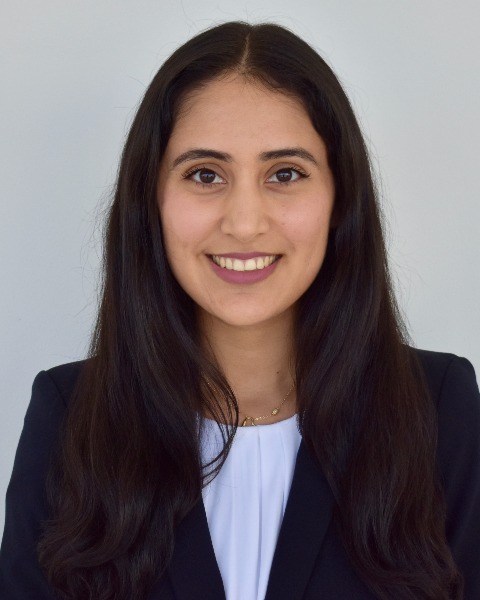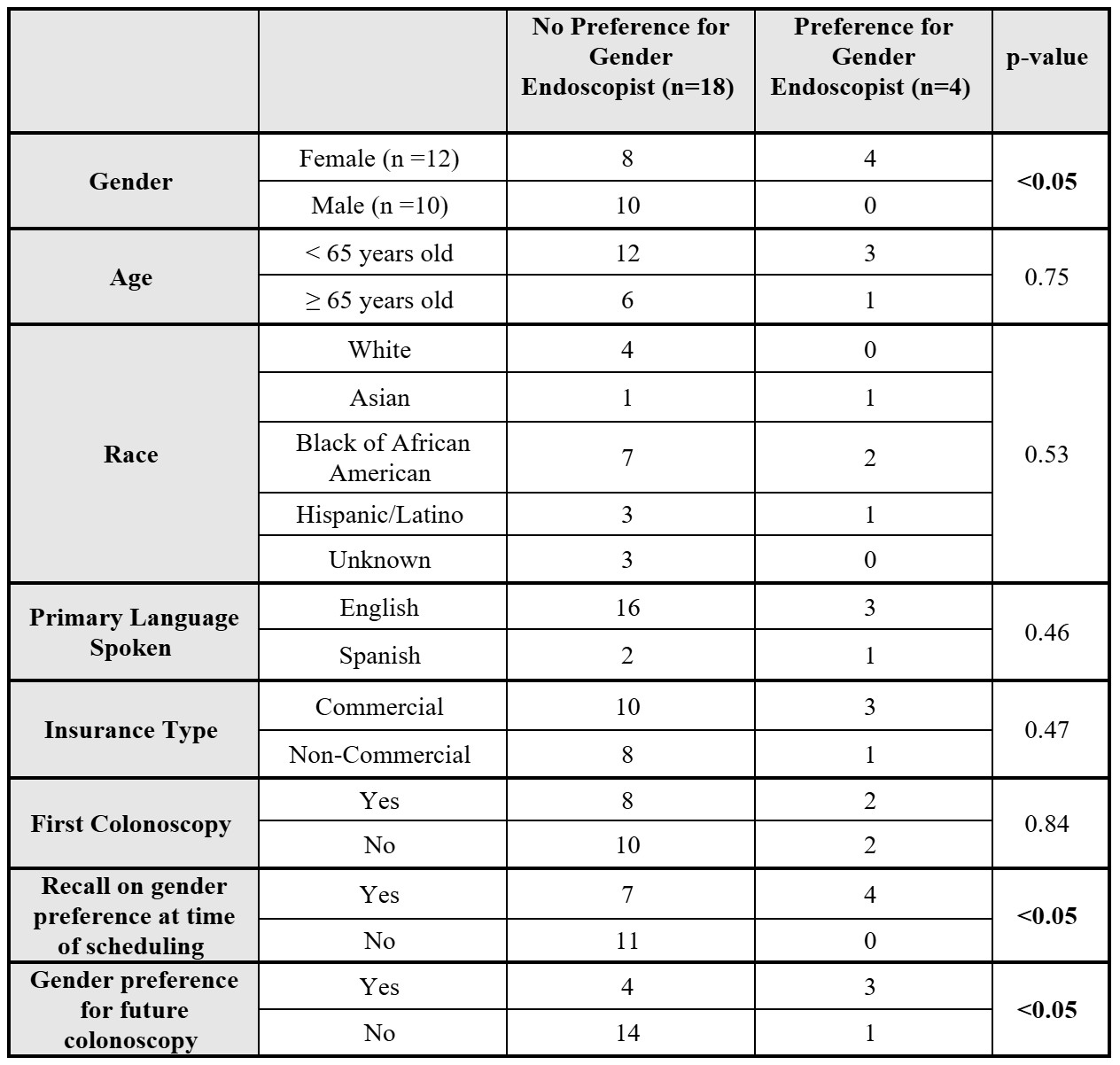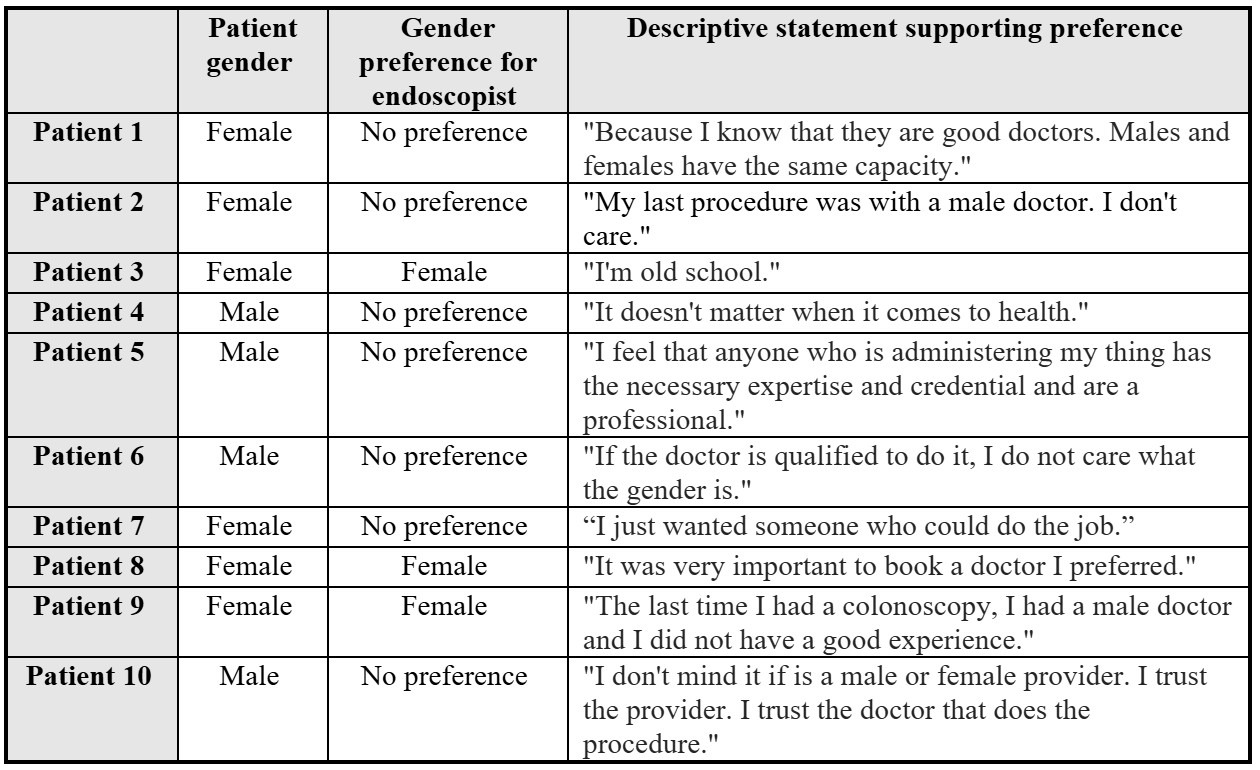Sunday Poster Session
Category: Practice Management
P1919 - Mind the Gender Gap: A Pilot Initiative to Match Patient Preferences for Endoscopist Gender
Sunday, October 26, 2025
3:30 PM - 7:00 PM PDT
Location: Exhibit Hall

Sonia Mehra, MD
Mount Sinai West & Morningside, NY
Presenting Author(s)
Sonia Mehra, MD1, Lauren Alpert, MD2, Lina Jandorf, MA2, Marin Gonzalez, 2, Yuying Luo, MD1
1Mount Sinai West & Morningside, New York, NY; 2Icahn School of Medicine at Mount Sinai, New York, NY
Introduction: Patient preference towards the gender of their endoscopist may serve as a potential barrier for colorectal cancer screening adherence based on previous studies. The aim of this pilot study is to assess if honoring endoscopist gender preference impacts patient satisfaction outcomes.
Methods: We conducted a mixed-methods study over a two-week period. Patients referred for direct access colonoscopy at a tertiary care center were asked about gender preferences prior to scheduling. A voluntary post-procedure patient survey was conducted to assess satisfaction with a 5-point Likert scale and qualitative questions. Demographic data were obtained via chart review. Qualitative and quantitative analysis was performed.
Results: Of the 49 patients asked about gender preferences (25 female, mean age 55.8 ± 11.1 years), 9 patients (18.4%) expressed a preference; all female and 50% of male patients preferred a female endoscopist. 16 patients (32.7%) were excluded as their procedures were scheduled beyond the study time frame (including 5 patients with gender preferences); the remaining 33 patients were contacted. Of this cohort, 22 patients (12 female, mean age 57.6 ± 10.2 years) completed the survey, with 10 patients (45.5%) undergoing their first colonoscopy (Table 1). Only 50% of patients recalled being asked about preference; there was no significant difference in satisfaction ratings between patients matched with their preference (4.72/5) compared to patients without preference (4.70/5). Qualitative patient responses are listed in Table 2. Patients who initially had a gender preference for their endoscopist were more likely to have a preference for future colonoscopies compared to those without an initial preference (75% vs. 22%, p < 0.05). Among those who had undergone a prior colonoscopy, including both patients with (n = 2) and without a gender preference (n = 8), 66.7% reported their current procedure to be more satisfying compared to previous.
Discussion: Fewer than 20% of patients expressed a gender preference for their endoscopist; however, amongst those matched with their preference, 75% expressed a gender preference for future colonoscopies and almost a quarter of patients without an initial gender preference expressed a preference for future procedures. Over two-thirds of patients who had a previous colonoscopy reported increased satisfaction. Inquiring about patients’ gender preferences for endoscopist may improve overall satisfaction, even if patients do not express a preference.

Figure: Table 1: Gender Preferences by demographic and variables of interest

Figure: Table 2: Sample patient descriptive statements supporting preference
Disclosures:
Sonia Mehra indicated no relevant financial relationships.
Lauren Alpert indicated no relevant financial relationships.
Lina Jandorf indicated no relevant financial relationships.
Marin Gonzalez indicated no relevant financial relationships.
Yuying Luo: Ardelyx – Grant/Research Support.
Sonia Mehra, MD1, Lauren Alpert, MD2, Lina Jandorf, MA2, Marin Gonzalez, 2, Yuying Luo, MD1. P1919 - Mind the Gender Gap: A Pilot Initiative to Match Patient Preferences for Endoscopist Gender, ACG 2025 Annual Scientific Meeting Abstracts. Phoenix, AZ: American College of Gastroenterology.
1Mount Sinai West & Morningside, New York, NY; 2Icahn School of Medicine at Mount Sinai, New York, NY
Introduction: Patient preference towards the gender of their endoscopist may serve as a potential barrier for colorectal cancer screening adherence based on previous studies. The aim of this pilot study is to assess if honoring endoscopist gender preference impacts patient satisfaction outcomes.
Methods: We conducted a mixed-methods study over a two-week period. Patients referred for direct access colonoscopy at a tertiary care center were asked about gender preferences prior to scheduling. A voluntary post-procedure patient survey was conducted to assess satisfaction with a 5-point Likert scale and qualitative questions. Demographic data were obtained via chart review. Qualitative and quantitative analysis was performed.
Results: Of the 49 patients asked about gender preferences (25 female, mean age 55.8 ± 11.1 years), 9 patients (18.4%) expressed a preference; all female and 50% of male patients preferred a female endoscopist. 16 patients (32.7%) were excluded as their procedures were scheduled beyond the study time frame (including 5 patients with gender preferences); the remaining 33 patients were contacted. Of this cohort, 22 patients (12 female, mean age 57.6 ± 10.2 years) completed the survey, with 10 patients (45.5%) undergoing their first colonoscopy (Table 1). Only 50% of patients recalled being asked about preference; there was no significant difference in satisfaction ratings between patients matched with their preference (4.72/5) compared to patients without preference (4.70/5). Qualitative patient responses are listed in Table 2. Patients who initially had a gender preference for their endoscopist were more likely to have a preference for future colonoscopies compared to those without an initial preference (75% vs. 22%, p < 0.05). Among those who had undergone a prior colonoscopy, including both patients with (n = 2) and without a gender preference (n = 8), 66.7% reported their current procedure to be more satisfying compared to previous.
Discussion: Fewer than 20% of patients expressed a gender preference for their endoscopist; however, amongst those matched with their preference, 75% expressed a gender preference for future colonoscopies and almost a quarter of patients without an initial gender preference expressed a preference for future procedures. Over two-thirds of patients who had a previous colonoscopy reported increased satisfaction. Inquiring about patients’ gender preferences for endoscopist may improve overall satisfaction, even if patients do not express a preference.

Figure: Table 1: Gender Preferences by demographic and variables of interest

Figure: Table 2: Sample patient descriptive statements supporting preference
Disclosures:
Sonia Mehra indicated no relevant financial relationships.
Lauren Alpert indicated no relevant financial relationships.
Lina Jandorf indicated no relevant financial relationships.
Marin Gonzalez indicated no relevant financial relationships.
Yuying Luo: Ardelyx – Grant/Research Support.
Sonia Mehra, MD1, Lauren Alpert, MD2, Lina Jandorf, MA2, Marin Gonzalez, 2, Yuying Luo, MD1. P1919 - Mind the Gender Gap: A Pilot Initiative to Match Patient Preferences for Endoscopist Gender, ACG 2025 Annual Scientific Meeting Abstracts. Phoenix, AZ: American College of Gastroenterology.
